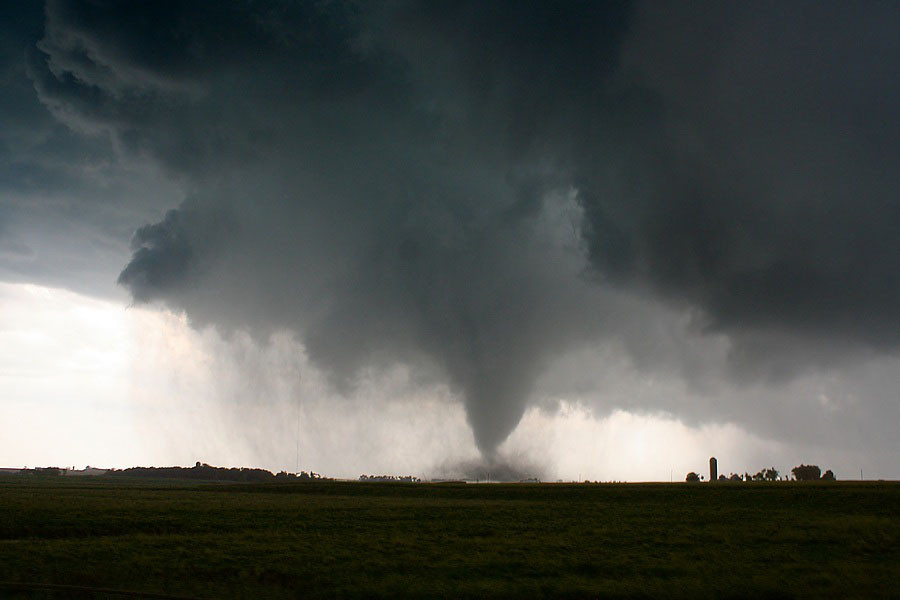How to survive a tornado

The storms that have recently ripped through the South included dozens of tornadoes. And as the bad weather barreled north today, the National Weather Service declared a tornado watch for eastern parts South Carolina, North Carolina, Virginia, and Maryland, and warned of severe weather as far north as Boston (the sky outside my window is definitely looking a little ominous).
Strong wind from any sort of severe weather can wreak havoc, but the speed and spinning winds of a tornado are especially destructive.
Remarkably, relatively few lives are lost to tornadoes. During an average year, tornadoes kill about 60 Americans, which is about the same number of people who killed by lightning strikes.
But this is not going to be an average year. The death toll from the terrible storms in the South is approaching 300. And the number is climbing.
The Centers for Disease Control and Prevention (CDC) has some suggestions for what to during a tornado. The National Weather Service’s Storm Prediction Center has posted a tornado FAQ (frequently asked questions) that covers tornado safety—and pretty much anything else about tornadoes you can think of.
Here are some the main points from the CDC, the weather service FAQ, and a few other sources:
- Head to the basement. If you are inside, below ground is the safest place to be. But it’s a myth that you should head to the southwest corner. Tornadoes can come from any direction and the swirling winds can be blowing from any direction.
- Get away from windows. Tornadoes can make windows suddenly shatter as if they were exploding. It’s another myth that opening windows can somehow equalize the pressure inside the huse and out. In the words of the National Weather Service’s FAQ, opening windows “is absolutely useless, a waste of precious time, and can be dangerous.”
- If there is no basement, head to an inside room or hallway on the lowest floor. Although some people think the safest place is in the bathtub, the main thing is to get away from the windows and outside walls. Researchers who studied the deaths and injuries from powerful tornadoes that hit the Oklahoma City area on May 3, 1999, found that basements and hallways were the safest places to be.
- Hide under a heavy table. Most deaths and injuries from tornadoes are from falling or flying debris. A heavy table or work bench could protect you. The CDC also advises covering your body with a blanket, sleeping bag, or mattress.
- Do not stay in a mobile home. Mobile homes don’t attract tornadoes. But they are a dangerous place to be if a tornado hits. In the Oklahoma City storm, people inside mobile homes were 35 times more likely to die than people in other sorts of buildings, and 12 times more likely to suffer severe injuries.
- If you’re outside, get low and away from trees. Find a gully or ditch, lie flat, and cover your head. And get as far away as possible from cars or other objects that the tornado could lift.
- Avoid “long-span” buildings. Shopping malls, theaters, and gymnasiums can be especially dangerous because the roof is supported only by the walls. If there is no time to leave such a building to get to a safer place, get under a door frame or something else that could deflect falling debris.
- A mixed message on cars and driving. The least desirable place to be during a tornado is in a motor vehicle, and the CDC warns against trying to drive away from one. In some tornadoes, a disproportionate number of people in cars have been killed. But in the Oklahoma City storm, researchers calculated that the death and severe injury rate was lower among people in cars than among those outside or in mobile homes. The weather’s services FAQ says vehicles are a “notorious deathtrap” in tornadoes, but advises either leaving the vehicle or driving out of the tornado’s path.
About the Author

Peter Wehrwein, Contributor, Harvard Health
Disclaimer:
As a service to our readers, Harvard Health Publishing provides access to our library of archived content. Please note the date of last review or update on all articles.
No content on this site, regardless of date, should ever be used as a substitute for direct medical advice from your doctor or other qualified clinician.












